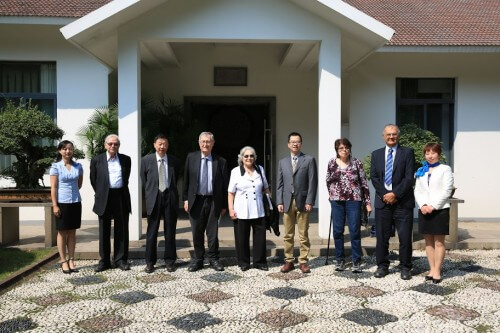The Israeli Academy of Sciences gave a particularly warm welcome to the delegation from the Chinese Academy of Sciences

A delegation of the Israeli National Academy of Sciences recently visited China, renewing and expanding the agreement for scientific cooperation (first signed in 1991) as part of the effort to strengthen Israel's academic ties with the countries of the world. The official visit, at the invitation of the Chinese Academy of Sciences, marked the 25th anniversary of the beginning of scientific ties between the two countries and according to the participants, it was unusual in its warmth and the great respect the Chinese showed to the members of the Israeli academic delegation.
Prof. Ruth Arnon, the outgoing president of the Academy of Sciences and who headed the delegation, said that in recent years the scope of scientific activity between the countries has greatly increased and expanded and it includes hundreds of Israeli researchers and scientists who visit China every year and at the same time hundreds of Chinese scientists visit Israel. For example, two members of the Academy of Sciences and Nobel laureates - Professor Dan Shechtman and Professor Aharon Chechenover - are currently establishing scientific research institutes in China. The Academy of Sciences points out that China now has modern and innovative laboratories and advanced scientific and medical equipment that can be of interest to Israeli scientists, and therefore every year there is also an increase in scientific ties between universities and scientists from Israel and China.
The CEO of the Academy of Sciences, Dr. Meir Zadok said that the Chinese are eager and interested in expanding science ties with Israel, they are aware and up-to-date on Israeli science and are ready to invest here. According to him, the members of the Academy received a particularly warm and serious welcome, and it included a visit to China's leading laboratories in the field of biotechnology and nanotechnology, with the hosts making an effort to present the best of Chinese science to the guests from Israel. Among other things, the members of the delegation met with Chunli Bei, president of the Chinese Academy in the capacity of minister.
The Israeli delegation to China was attended by Prof. Ruth Arnon, Prof. Yehoshua Yortner, who was the president of the academy at the time of the beginning of the ties, Dr. Meir Zadok and also present was Matan Vilnai, the Israeli ambassador to China.
The visit was held against the background of receiving the first Nobel Prize given to the Chinese scientist Prof. Tu Yu Yu, a prize given these days.
It is worth noting that the Israeli National Academy of Sciences operated during the first two years in China (1990) as part of an academic center that preceded the official diplomatic ties that came later. During the establishment period, Israeli scientists acted as pioneers in promoting relations with Chinese scientists in the fields of agriculture and water, and an agricultural farm was even established for training.
This scientific activity, which was carried out with great dedication at the beginning, catalyzed the promotion of diplomatic relations between the two countries and formed the basis of friendship and appreciation between the two peoples.
Prof. Ruth Arnon said at the ceremony that the scientific community in Israel was happy to be at the time a pioneer ahead of the camp in promoting the science ties that formed the solid foundation for the ties that exist today between the two nations in all fields.

2 תגובות
Yair will indeed clarify a good wording
At the moment, China (with an emphasis on currently) does not require us to fold in front of the Palestinians, therefore any academic and commercial cooperation with them is welcome.
Regardless, we as a people have a problem, what to do with the issue of 5.5 million Palestinians between the Jordan and the sea? On the one hand, it is not possible to keep them in 3 heads (Gaza 1.85, Israel 1-1.5, IOSH all the rest) without citizenship rights for 2/3 of them. On the other hand, they behave like Daesh and do not want to stop halfway. This is a problem that leaders of stature will have to solve. Surely the union's solution is not in our favor.